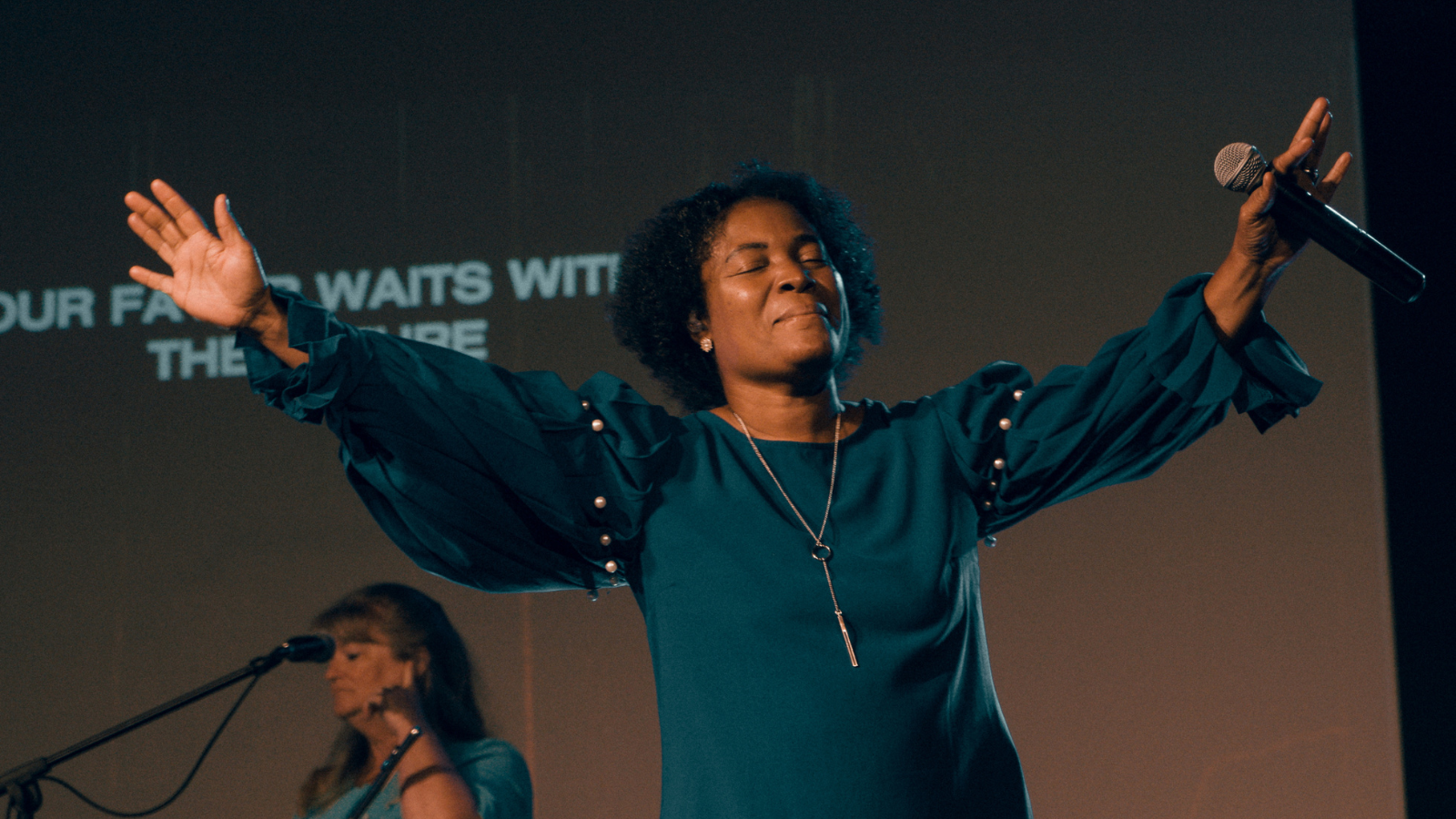The first time I considered fasting in the Bible was when I was in college.
Some friends in the campus ministry I was a part of decided to participate in a Christian fast together.
We went 24 hours without eating food and drank only water.
I don’t remember why we were fasting, but I do remember how it made me feel. It was hard. But also kind of awesome.
I’ve participated in a variety of fasts in the 20 years since then, some on my own and some as part of a community. Fasting for Christians is a powerful way to elevate your prayers and your relationship with God.
Yet even now I’m still learning about Christian fasting! I did a bunch of research for this article and was surprised to discover there were some things I didn’t know.
What is Fasting in the Bible?

Fasting in the Bible is a spiritual practice that involves voluntarily avoiding food, drink, or other substances or activities for a specific period.
Found during significant events throughout the Old and New Testaments, fasting in the Bible could be an act of seeking guidance or intercession, expressing grief, showing devotion, or practicing repentance. A Christian fast is a practice that closely follows this tradition.
Types of Fasting in the Bible

There’s a lot more to fasting than simply going without food for a predetermined amount of time.
In fact, there are several types of fasts, and each one comes with its own guidelines and benefits.
While there isn’t a clearly set number of different types of fasting in the Bible, some helpful categories to consider include:
- Total fasting
- Partial fasting
- corporate fasting
- Habitual fasting
- Abstinence from something other than food and drink
1. Total Fasting

A total fast is the most extreme form of fasting in the Bible and involves taking in no food or water for a period of time.
Some of the most notable instances of total fasting in the Bible of this nature include Moses on Mount Sinai (Exodus 34:28, Deuteronomy 9:9), Esther and the Jewish people before she met with the king (Esther 4:16), and Saul (Paul) when he encountered Christ (Acts 9:9). Moses’ experience was clearly supernatural.
This approach to fasting is one of the most difficult to follow because it deprives you of your most basic needs.
While Biblical fasting is a way to trust God’s provision, you still want to approach it wisely and safely!
2. Partial Fasting

A partial fast is similar to a total fast in that it involves abstaining from food or drink but isn’t as strict. A common way to fast is to avoid food but still drink water. You might also abstain from certain types of food or drink like meat, alcohol, or sugar, or do something like a liquid fast or whole food-only fast.
While there is some debate about this, most of the examples of fasting in the Bible involved fasting from food. Total fasting from both and water can be inferred when the text explicitly says so. Otherwise, it’s assumed that the people involved drank water during the fast.
Another example of partial fasting in the Bible is when Daniel requested to have only vegetables and water (Daniel 1:8–16). The Daniel fast is a popular modern adaptation of these Scriptures on fasting.
3. Abstinence Fasting

Fasting in the Bible doesn’t have to be just from food or drink; it can also be abstinence from certain activities or substances.
Examples of this type of fasting include not using lotion (Daniel 10:3) and avoiding sex (Exodus 19:15, 1 Corinthians 7:5).
This is a popular approach to Christian fasting today. While there aren’t many examples in the Bible, it is still a practical way to deny yourself and draw nearer to God. You can fast from things like social media, spending, or anything you find pleasurable.
4. Corporate Fasting

Corporate fasting is any kind with a group.
This practice could be something like fasting during Lent, which is observed worldwide, or with your local church or small group.
Examples of corporate fasting in the Bible include the Israelites when Moses was on Mt. Sinai (Exodus 19:15), the Jewish people when they were praying for Esther (Esther 4:16), Daniel together with his friends (Daniel 1), and the remnant of God’s people when they returned to Jerusalem (Ezra 8:21).
I like corporate fasting because it gives you a sense of solidarity and unity with other people. If it’s an especially challenging fast, it’s encouraging to have people doing it with you!
5. Habitual Fasting

Habitual fasting is any type of fasting practiced as a spiritual discipline, intended to help you grow and deepen your relationship with God. You can observe habitual fasting as often as you want.
Some examples of people who practiced habitual fasting in the Bible include Anna (Luke 2:37) and the Pharisees (Luke 18:12).
Some people choose to fast for health purposes, so making it a habitual spiritual fast is a practical way to care for your body and draw close to God while you do so.
Why Do Christians Fast?

There are many purposes of Christian fasting in the Bible including:
- seeking guidance.
- expressing grief.
- showing repentance and humility.
- praying for God’s intercession and deliverance.
- worshiping and showing devotion.
These examples of fasting for God are just a few possible categories and can easily overlap. There is really no limit to reasons to fast.
Another way to look at Biblical fasting is as an extension of an active prayer life. If you’re praying in any way or form, you can be fasting too!
1. Seeking Guidance

This kind of fasting in the Bible was recorded when God’s people were seeking His will and His wisdom in their next steps.
One example of this is in Acts 13:3 when the leaders in Antioch were preparing to send Saul (Paul) and Barnabas on a mission trip.
Christians today can easily imitate this type of Biblical fasting whether we’re sending out missionaries of our own or doing anything to advance God’s kingdom.
2. Expressing Grief

Fasting in the Bible is often used as an expression of grief.
The scribe Ezra mourned over the unfaithfulness of the Israelite exiles and expressed his grief through fasting (Ezra 10:6). Jesus also connected fasting with mourning in Matthew 9:15 as he explained why His disciples were not fasting while they were with Him.
Many of us in modern Western culture struggle with processing grief. Christian fasting is a way to connect what’s happening in your heart and soul to your physical body.
3. Repentance and Humility

Fasting in the Bible is frequently practiced as an expression of repentance from sin and humility before God.
In Joel 2:12, God calls His wayward people back to him and asks them to fast, mourn, and weep.
If you’ve ever been fasting for God, then you know that it is a very humbling experience! It pairs well with repentance because it helps you be more in touch with your own weaknesses and need for God’s strength and provision.
4. Intercession and Deliverance

There are many instances of fasting in the Bible that are connected with praying for God’s intercession and deliverance in times of need.
This was the purpose of fasting for Esther before she went to the king of Persia to ask for his help.
There have been times I’ve fasted in which it felt like an amplification of my prayer requests. While God can hear us anyway, fasting for deliverance helps our own hearts trust in God as we express our needs.
5. Worship and Devotion

You don’t need a specific reason to fast; fasting in the Bible is also simply an act of worship and devotion to the Lord.
Isaiah 58 describes “true fasting” that accompanies a life of faithfulness that also shows generosity and justice.
Christian fasting isn’t just an item to check off your spiritual checklist. When practiced prayerfully, it’s part of a whole life that walks in step with God’s Spirit.
Interesting Fasting Scriptures

There are many Bible verses about fasting in the Bible!
Here are a few of the most relevant Scriptures about fasting in the Bible.
- Exodus 34:28: “Moses was there with the Lord forty days and forty nights without eating bread or drinking water. And he wrote on the tablets the words of the covenant—the Ten Commandments.”
- Deuteronomy 9:9: “When I went up on the mountain to receive the tablets of stone, the tablets of the covenant that the Lord had made with you, I stayed on the mountain forty days and forty nights; I ate no bread and drank no water.”
- 1 Samuel 7:5–6: “Then Samuel said, ‘Assemble all Israel at Mizpah, and I will intercede with the Lord for you.’When they had assembled at Mizpah, they drew water and poured it out before the Lord. On that day they fasted and there they confessed, ‘We have sinned against the Lord.’ Now Samuel was serving as leader of Israel at Mizpah.”
- Ezra 8:21-23: “There, by the Ahava Canal, I proclaimed a fast, so that we might humble ourselves before our God and ask him for a safe journey for us and our children, with all our possessions. I was ashamed to ask the king for soldiers and horsemen to protect us from enemies on the road, because we had told the king, ‘The gracious hand of our God is on everyone who looks to him, but his great anger is against all who forsake him.”So we fasted and petitioned our God about this, and he answered our prayer.'”
- Esther 4:16: “Go, gather together all the Jews who are in Susa, and fast for me. Do not eat or drink for three days, night or day. I and my attendants will fast as you do. When this is done, I will go to the king, even though it is against the law. And if I perish, I perish.”
- Daniel 10:2–3: “At that time I, Daniel, mourned for three weeks. I ate no choice food; no meat or wine touched my lips; and I used no lotions at all until the three weeks were over.”
- Matthew 4:1-2: “Then Jesus was led by the Spirit into the wilderness to be tempted by the devil. After fasting forty days and forty nights, he was hungry.”
Brittany Ann is an ECPA bestselling author and founder of Equipping Godly Women and Monetize My Ministry. She’s also a Christian speaker, podcaster, and conference host. Her work has been featured on numerous TV, radio, and online ministries, including CBN, MSN, Christianity Today, Evangelical Alliance, Patheos, Crosswalk, and more.

